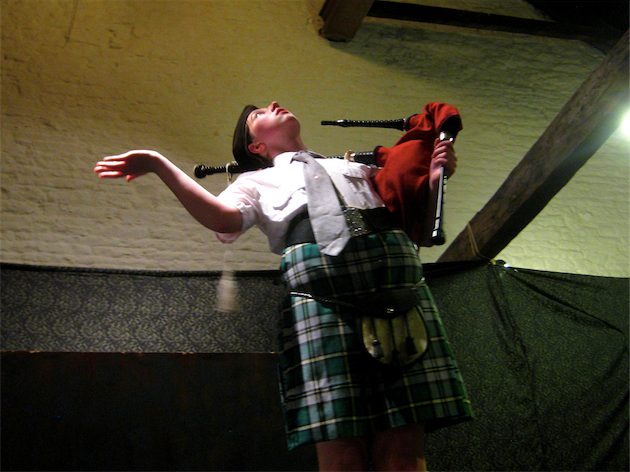
I had high expectations for Echoes from Dawn Fraser and Pipe Dreams the two Saturday night plays in the Summer Theatre festival, organized by the Cape Breton Stage Company. Jana Gillis’ comedic act in Live at the End of the World made me curious to see her performing her own material. Meanwhile, Wayne McKay was so thoroughly impressive in both the writing and execution of last year’s With a Mighty Hand that I wondered whether he set for himself a difficult act to follow.
Both one-person plays were wonderful displays of writing and acting strengths. The pairing was complementary, but each deserves to be considered on its own. This pair of plays will be performed each Saturday until August 28. Showtime is 8pm at St. Patrick’s Museum on the Esplanade in Sydney with the exception of August 7, when the Stage Company will hit the streets with their outdoor theatre festival.
Echoes from Dawn Fraser, by Wayne McKay
McKay’s play Echoes from Dawn Fraser was the first act of the night. McKay is fond of taking inspiration from the bounty of historical figures from his hometown Glace Bay, and I was excited to see poet Dawn Fraser be given dramatic treatment. If you’re not familiar with Fraser’s poetry, McKay’s play is the perfect introduction.
McKay worked a script using selections from Fraser’s Echoes from Labor’s Wars, a collection of poems and stories about Industrial Cape Breton’s workers in the 1920s. He assumes the persona of Dawn Fraser himself, reciting his poems and partaking in friendly banter with the audience as though they are customers in Fraser’s general store. The venue of St. Patrick’s Museum works well for the strengths of this play, enabling McKay to create a sense of intimacy and an early 20th century rustic feel.
This play, however, is more than simply a vehicle for nostalgia. When McKay’s character explains the political and moral significance of each poem, he avoids mentioning too many names and details, sticking instead to explaining power dynamics between the large corporations, the government, and the workers who struggle under the thumbs of the powerful. With this approach, McKay compels the critical viewer to consider just how much of Fraser’s poetry is applicable in the present. Whether it’s the Toronto police charging on protesters while the world’s leaders are wined and dined behind the barricades, the increasing pressure on unions to concede to wage and pension cuts while owners count profits during the recession, or the recruitment of soldiers to fight for the interest of the elites, there are many parallels to be drawn.
The play hits its emotional climax with the surprise inclusion of “Out of My House, No Child of Mine Will be a Boy Scout”, admittedly one of my favourites of Fraser’s poems. It’s no surprise that the corporations, the business friendly politicians, and capitalism itself would be subject to Fraser’s righteous indignation, but to put an otherwise innocuous organization under the same scrutiny provides an unexpected lesson on how military and police are often used to protect economic interests rather than people. The inclusion of this poem isn’t an obvious choice, but it was a wise choice on McKay’s part.
It’s not quite right to call Fraser’s poetry “timeless”. Such a virtue is overvalued in the art world. The beauty and importance of the poetry–and McKay’s theatrical adaptation–is its urgent timeliness, its message firmly situated in the harsh conditions that confronted the workers of the day.
Fraser’s Echoes from Labor’s Wars can be purchased online from Breton Books.
Pipe Dreams by Jana Gillis
It’s apparently politically incorrect to refer to visitors as “tourists”–even if their trip to Cape Breton has nothing to do with visiting relatives, and everything to do with being carted around the Cabot Trail on a tour bus.
Such is the playfully subversive wit of Jana Gillis’ play Pipe Dreams. As the bagpiper playing for “visitors” in a gift shop parking lot during “visitor” season, Gillis lets the audience in on her kilt-clad life of seasonal “visitor” industry employment. Her monologue is based partly on the typical spiel that a piper would give when explaining the instrument and standard uniform, but goes a step further to let us know what it’s really like to be a kitschy cultural commodity.
Gillis is a brilliant writer, and can speak volumes with a few well-chosen words and actions. There is a particularly brilliant moment where, after Gillis explains to her audience just how soul-crushing the constant requests to play “Scotland the Brave” are, she spies a tour bus coming over the hill and excitedly launches into the tune in anticipation of receiving a few dollars’ worth of tips. It is, in a nutshell, working life in the service sector.
In watching the performance, you tend to forget that performing in a one person play is incredibly demanding. Gillis’ deftly executed story of encountering a car full of traveling stoners was one of the most highly appreciated moments in the play, and one where her acting skills were put to good work.
Overall, Pipe Dreams is a fun commentary on how our relationship to culture changes when we prepare it for tourist consumption. Sometimes doing what you love involves doing it on a set of terms that can be insufferable.
For more information on the Cape Breton Stage Company and their Summer Night Theatre Festival, visit capestage.ca


JanaG says
Hi, can you perhaps note that I'm playing the "Piper", and not myself? Thanks.
Lovely article!
Cheers.
devonstrang says
Fixed! Thanks for the heads up, Jana.